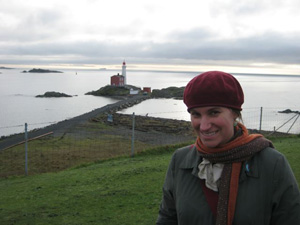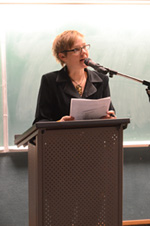Dark Investigations: Yvonne Blomer in Conversation with Anita Lahey

Victoria's Poet Laureate Yvonne Blomer talks with Anita Lahey, assistant series editor of Best Canadian Poetry in English and past editor of Arc Poetry Magazine, about her role as moderator for Investigative Poet: Observer, Researcher, Analyst, one of three interactive panel discussions at this year's literary symposium, WordsThaw.
This panel will take place Saturday, March 19, 1:30 p.m. - 3:30 p.m., at the University of Victoria.
Often poets are thought of as artists, those who can take facts or “truths” and do with them as they wish. A poet might remind herself that she doesn’t have to stick to the facts, which sometimes get in the way of the poem. She may remind herself to play with those truths to reach deeper or other truths. How does this notion of the poet or how a poem develops relate to your idea of poet as researcher or journalist?
I’m thinking about how a poet can absorb a fact and transform it, through language, context, juxtaposition—how poets, unlike journalists, can take the fruits of their research and not so much present that data inaccurately, but find a home for it within a poem that gives it a changed reality, that maybe brings to the surface a different truth within the fact than the one we previously noticed or thought was important. This is how poets can offer a slant perspective, or turn our sense of reality (and their own) upside down. To create this kind of art a fidelity to the facts—a reliance on facts, of both the ordinary and extraordinary kind—is necessary, just not perhaps the sort of fidelity we are accustomed to in mainstream journalism.
How do you think anthologies such as Best Canadian Poetry in English and poems where poets are commenting on or exploring historical events change the public’s relationship to poetry? In your ideal version, I guess, where the public is actively reading poetry?
When poets delve into history they can offer compelling, powerful antidotes to prevailing attitudes or stubborn narratives that may be incomplete or even unjust. This kind of poetry is an invitation to re-examine what we think we know about our collective past and our culture. I think if the average reader who is a little intimidated or put off by poetry understood how poets actively and creatively question and challenge what we hear on the news, read in the papers or in history texts, they would be far more inclined to wade into the world of verse. For here are current events and history both layered and exposed, with competing narratives and truths sometimes shockingly entwined—here are our stories, with all the gaps, inconsistencies and horrors they contain, riding in on the backs of wit, humour and language play. These are often serious and even dark investigations, but because they involve creation and its attendant energies and mysteries, they are not without joy.
Kim Trainor will be one of the panelists. Can you talk about her poem “Nothing is Lost” in relation to this panel and to other ideas of poetry and research? Can you introduce the other panelists and touch briefly on what you hope will come out of the discussion?
Kim has thought a great deal about how research feeds and might also hinder the making of poetry, and I will let her speak to that herself. One example of her own poetic research is her long poem “Nothing is Lost,” which appears in her recent book Karyotype and was instigated in part by the “Book of Belongings” created by the International Committee of the Red Cross to aid in the identification of thousands of the “Srebrenica missing” after the war in Bosnia-Herzegovina. The poem, as Kim will explain, does not contain a huge number of facts or even specific items mentioned in the Book—the fact of the book itself, the fact of the war and the thousands who remain “missing,” fed the poem and her investigations into lament, longing, genocide, the idea of the individual with his or her particular “belongings” facing the consequences of war.
Arleen Paré is another one of our panelists. Her poetry grows out of considerable research in the realms of literature and culture, geography, history and natural history—which becomes melded with personal perspective, narrative, voice and so on. She also speaks of the importance of emotional research: a deep plumbing of the mind, heart and “soul.” Her rich and layered 2014 collection Lake of Two Mountain, which won the Governor General’s Award for Poetry, is a testament to this layered practice, and she is working on a new research-intensive project that she will also discuss.
Our third panelist is Kyeren Regehr, a poet who, as an academic, has explored the notion of poets as “recorders of the emotional and intellectual temperatures of the times.” As a poet having delved into ashram culture both in real life and in her writing, she can speak to how personal experience can morph into a form of poetic research. Her current project, supported by her second grant from the Canada Council for the Arts, has her investigating spirituality and mysticism through her own experiences (both highly personal and journalistic), as well as culturally and historically. She says, “Intensely personal work often needs the scaffolding of external research so that one may place a window or a small door through which a reader may enter.”
I wonder if you can comment on whether poets can find insight into the world and world events when journalism is less rigorous, and information packaged in tweets and Facebook updates? How can the public know what sources to trust? How can the public know if it can trust the poets? What information can the poets trust?
As a reader, I look to poets more and more for that layered consideration and context—and the imaginative and unexpected angle on an issue or event—that is harder and harder to find in ordinary news sources. As a journalist by trade, I get a bit defensive when people say journalism is rote whereas writing such as poetry is creative: good journalism (which gets harder to find as resources are squeezed) is meant to be creative, too. Not in the sense of “making up” the facts, but in the sense of how the facts are considered and gathered, what kinds of questions are asked, what angles pursued. I had a professor who tried to hammer into us budding reporters a penchant for “lateral thinking,” for coming at the current events we were reporting in ways that would turn the obvious perspectives inside out, and thus reveal a hidden or unexpected truth. I have to say, with apologies to my first profession, that in general I see poets doing this with more consistency, vigour and power than journalists: it is the poets who are peeling apart what’s happening around us to uncover ideas, possibilities and realities that, on our own, we tend to miss. They do this with current events, with recent history, and with the past. They are melding old media with new in their research, and in their voices and forms.
I do think that poets, like everyone else, need to be careful of online “sound bites” and instant reactions and conclusions, the culture of cleverness and self-affirmation. We tend to see the “truths” we are already drawn to, by virtue of our own filters, what we “click” on, our selection of feeds to follow and our online “friends.” We hope the poets are pushing us past our easy answers, our usual perspectives and pathways. I think if we are thoughtful readers, we can tell when we are reading a poet whose exploration into world events and human nature we can trust, versus one who is simply “feeding us” lines. The poet who is opening doors, broadening possible understandings, posing (sometimes uncomfortable) questions, delicately building through written lines a nest of ambiguities—there is the poet whose collection belongs by your bedside.
More and more poetry seems to be turning its eye to the natural world not as an object of beauty but as something in jeopardy. How does this relate to your ideas of poet as journalist? In your introductory essay to the 2014 edition of BCP you say, “poets are allowed to momentarily confuse or confound our expectations: break open our habitual perceptions, turn our gaze.” Do you think there is hope of a new poetics in the reality of climate change?
This is actually something I address in my introduction to the latest edition of Best Canadian Poetry in English, published in fall 2015. The crisis we are facing regarding the state of the natural world is so paramount in the minds of poets it rears even in work chiefly addressing other themes. It has become part of our consciousness, part of the baseline from which we think, feel, write and create. To steer back to the idea of poets “having their way” with facts, poets are in a position where they can step back from what we’re facing, play with timelines, context, perspective, give us new angles on what we think we know. And they are doing this. And I do think there is hope. The new BCP anthology and just about every lit mag or collection you pick up contain evidence of a poetic vision that is desperately seeking, on behalf of us all, a way through. It’s elegiac and forward-looking, it’s humble and it’s fierce, it’s full of surprises—and as such the work of the poets stands as proof, to me, that we as a species may indeed surprise ourselves.
You are also the past-editor of Arc Poetry Magazine, can you speak for a moment to the importance of literary journals in Canada and giving voice to writers and also speak to the value of this kind of symposium where there are readings, panels, a lecture and master class?
I love this kind of event, where writers and readers can partake of meaty, probing discussion about the craft, about the strategies, concerns and even the duties of the writer—and about the joy and possibility in the work. The best magazines do this in print or online. At a symposium a different thing happens because, though they are embarked upon with some preparation, panel discussions build spontaneously, and which way they may turn is anybody’s guess. The readings, the lecture, and the master class, round it out: it’s like a miniature, intense, three-day graduate program. Minds meet; questions and ideas are shared and clarified; windows of thought creak—or are flung wide—open.
* * * * * * * *










